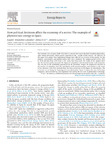How Political Decisions Affect the Economy of a Sector: The Example of Photovoltaic Energy in Spain

Ver/
Use este enlace para citar
http://hdl.handle.net/2183/28388
A non ser que se indique outra cousa, a licenza do ítem descríbese como Attribution 4.0 International (CC BY 4.0)
Coleccións
- Investigación (EPEF) [590]
Metadatos
Mostrar o rexistro completo do ítemTítulo
How Political Decisions Affect the Economy of a Sector: The Example of Photovoltaic Energy in SpainData
2021-11Cita bibliográfica
Fernández-González, R., Arce, E., & Garza-Gil, D. (2021). How political decisions affect the economy of a sector: The example of photovoltaic energy in spain. Energy Reports, 7, 2940-2949. doi:10.1016/j.egyr.2021.05.021
Resumo
[Abstract] The economic crisis in Spain (2008–2012) led to a massive decrease in the feed-in tariff on photovoltaic solar energy production, which caused stagnation in the growth of this market. The objective of this paper is to analyze how institutional changes have affected the structure of the market; for this purpose, concentration and stability indices have been calculated. The analysis period is from 2004 to 2018 and data from 5,353 firms in the sector have been used. The results of the analysis show that the incentive policy increased the degree of competition and attracted mostly small companies. This was due to the profitability guaranteed by the premiums. Despite the progressive decrease in the number of companies since the cancellation of the premium policy, concentration in the sector is low. However, from 2016 onwards there has been an increase in the degree of concentration. This is because we are facing the beginning of a new photovoltaic ”boom” in Spain, this time led by large companies, attracted both by a new legislative turn and by the low costs of photovoltaic technology.
Palabras chave
Energy policy
Sector concentration
Photovoltaic production
Spain
Sector concentration
Photovoltaic production
Spain
Versión do editor
Dereitos
Attribution 4.0 International (CC BY 4.0)
ISSN
2352-4847






